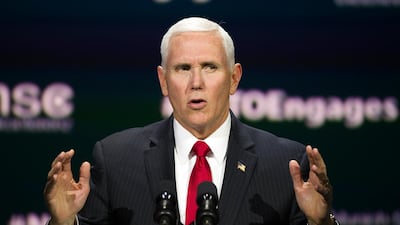US Vice President Mike Pence has warned Turkey that its Nato membership would be at risk if it went ahead with plans to buy Russia's S-400 anti-missile system, a purchase that Washington views as a threat to US military equipment.
Mr Pence was responding to Turkey's insistence that the Russian deal was done, signalling an apparent impasse between the allies.
"Turkey must choose. Does it want to remain a critical partner in the most successful military alliance in history or does it want to risk the security of that partnership by making such reckless decisions that undermine our alliance?" Mr Pence said at a meeting of Nato foreign ministers in Washington on Wednesday to mark the alliance's 70th anniversary.
Mr Pence said Turkey risked expulsion from the F-35 Joint Strike Fighter programme, which could cripple Turkish manufacturers who are making parts for the aircraft. And he raised the possibility of much broader ramifications.
Other US officials have stopped short of threatening Turkey's underlying relationship with America or Nato, but there have been growing calls for swift action, including sanctions, against Ankara to stop the S-400 purchase.
Turkey struck back promptly, with Vice President Fuat Oktay issuing his own ultimatum on Twitter: "The United States must choose. Does it want to remain Turkey’s ally or risk our friendship by joining forces with terrorists to undermine its Nato ally’s defence against its enemies?"
Turkish Foreign Minister Mevlut Cavusoglu appeared unmoved by the US threats, saying the purchase of the S-400 system "is a done deal. We will not step back from this."
The US has offered to sell Turkey the American-made Patriot missile defence system, but Mr Cavusoglu said it could not be delivered in time.
"We couldn't get it for 10 years," he said at the Atlantic Council on Wednesday morning. "That's why we had to buy from Russia. And we tried to buy from other allies as well. It didn't work. So it is an urgent need of Turkey. I mean, we need air defence systems urgently in Turkey."
Ankara says it needs the S-400s, to be delivered in July, to defend itself, as Turkey faces threats from militants at home and conflicts in neighbouring Syria and Iraq.
Mr Cavusoglu met on Wednesday with US Secretary of State Mike Pompeo and leaders of the House Foreign Affairs Committee, whose Democratic chairman and ranking Republican member said they "made clear our bipartisan opposition" to Turkey's plan to acquire the Russian missile system. Senior US politicians said they cautioned Mr Cavusoglu that deepening ties with Moscow "will risk sanctions and Turkey's involvement in the F-35 programme".
The US and other Nato members have complained about Turkey's purchase of the S-400 system, saying it was not compatible with other allied systems and would represent a threat to the F-35. Officials have said that Turkey's acquisition of both US and Russian systems could give Moscow access to sophisticated American technology and allow it to find ways to counter the F-35.
Mr Pence described the purchase as "deeply troubling" and said it "poses great danger to Nato, to the strength of the alliance".
On Monday, the Pentagon took its first retaliatory step and stopped delivery of F-35 fighter jet parts and manuals to Turkey.
But so far, Turkish pilots continue to train on the aircraft at Luke Air Force Base, outside Phoenix, Arizona. And, Pentagon leaders insist there is still hope for some type of negotiated settlement.
"We haven't given up on trying to work our way through this," said Gen Joseph Dunford, chairman of the Joint Chiefs of Staff. "We've made what we think is a very good offer for the Patriot to provide for the air defence capabilities of Turkey."
Acting Defence Secretary Patrick Shanahan also expressed optimism, saying he was confident that the Patriot system proposal would work out.
Mr Cavusoglu, however, said he believed Turkey can convince the US that the S-400 will not be a risk or threat to Nato.
"We made very clear that this system will not see any Nato system, including F-35s, as an enemy," he said. Turkey has proposed setting up a technical working group that would make sure the S-400 did not pose a threat, he added.

